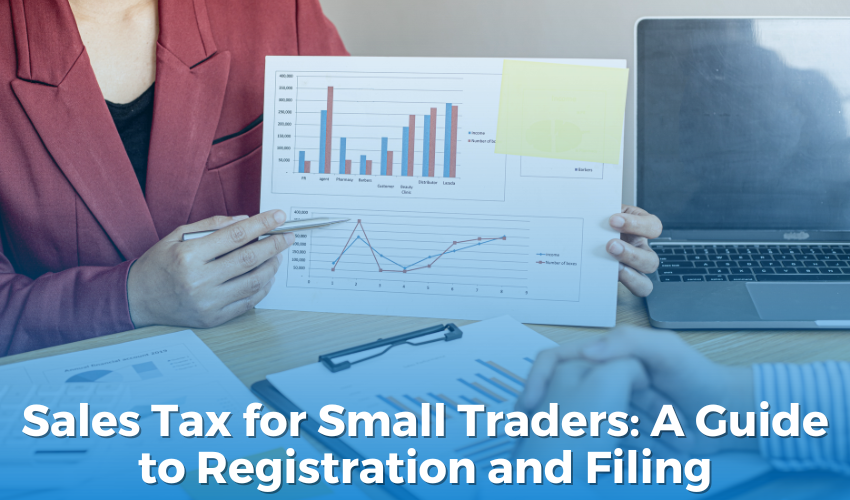

27-01-24
Sales tax is a critical element of conducting business for small traders. Understanding the nuances surrounding registration and filing is vital to maintaining compliance while running your company smoothly. In this guide, we will explore key components of sales tax, its significance for small traders, and offer step-by-step registration and filing instructions.
Importance of Sales Tax for Small Traders:
A sales tax is a consumption tax imposed by the government on the sale of goods and services. For small traders, collecting and remitting sales tax represents both legal and financial responsibilities. Here is why it matters:
Legal Compliance:
Small traders are legally obliged to adhere to tax regulations set by their governments. Any failure to do so could result in penalties, fines, or legal action being taken against them.
Funding Public Services:
Sales tax plays an integral part in funding public services and infrastructure, playing an essential role in community economic development, thereby fulfilling an essential aspect of responsible citizenship for small traders.
Customer Trust:
Charging and remitting sales tax instills confidence in customers that your business operates honestly and responsibly, further strengthening its standing in the market.
Before beginning the registration and filing processes, it's crucial to have an understanding of sales tax. Rates depend on your location; typically, they're calculated as a percentage of the sale price. While certain items might be exempt, other industries might have specific rules and exceptions that must be observed.
Small traders should understand these key concepts:
Small traders must determine where their nexus lies in order to collect and remit sales tax collections accordingly.
Understanding Taxable Goods and Services: Understanding which goods and services are taxable is vital. Tax rates depend on a range of factors; exemptions may apply for certain items.
Registration of Sales Tax for Small Merchants: Small traders should first register with their respective local governments to register for sales tax registration, which typically entails various steps that vary depending on where they operate their businesses. For instance:
Collect Necessary Information: Before initiating the registration process, gather all relevant details pertaining to business details, identification numbers, and banking information.
Establish Nexus:
Once your business has established a presence in one or more jurisdictions, such as where its physical location or conducts its business operations, is known or suspected to exist, identify which jurisdictions that it has an effect upon. These could be anywhere between your primary state of operation and others where business activity may be taking place.
Registration Online:
Many jurisdictions now provide online registration services, making the process easy and accessible. Simply follow the instructions of the tax authority and submit all the necessary data.
Wait for approval:
Upon submitting your application, there may be a brief wait for approval. When your sales tax permit has been granted, you'll receive notification.
Filing Sales Tax Returns:
Once registered, small traders must file sales tax returns at regular intervals, depending on factors like sales volume and the rules in their jurisdiction. Here is a step-by-step guide to filing sales tax:
Maintain Accurate Records: Keep accurate records of all sales transactions, including how much sales tax was collected from each purchase transaction.
Calculate Sales Tax Due: Utilize the data contained within your records to ascertain how much sales tax each jurisdiction owes.
Submit Your Return: Most jurisdictions offer online portals for filing sales tax returns. Simply log into this portal, provide all of the required data, and submit the return.
Once your return is filed, make the sales tax payment promptly to avoid incurring penalties.
Tips for small traders:
Utilize Accounting Software: Consider investing in accounting software which automates sales tax calculation and reporting to reduce errors and save time and resources.
Keep Up: Sales tax laws are constantly evolving; stay abreast of any modifications to ensure ongoing compliance.
Consider Seeking Professional Advice: If navigating sales tax regulations becomes cumbersome for your business, seek assistance from a tax professional. They will be able to offer customized guidance tailored specifically for your circumstances.
Conclusion:
For small traders, sales tax compliance and understanding is of vital importance in running a successful and compliant business. By following the steps outlined here, from registration to filing, small traders can confidently navigate its complex requirements with ease. Staying informed, keeping accurate records, and seeking professional advice as necessary are keys components to guaranteeing a seamless sales tax experience for their small trading business.
Tags : sales tax,sales tax services in usa













































.jpg)
.jpg)
.jpg)
.jpg)


).jpg)














 Get A Quote
Get A Quote
Leave A Comment